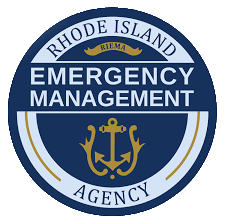Transportation Accidents
The State of Rhode Island is home to major highways, airports, railroads and marine ports. As a result of this distinction, growth and traffic issues in our region continue to increase the risk of transportation accidents, making our area vulnerable to all types of transportation emergencies.
Highways
Rhode Island has three Interstate highways, including I-95, the main highway on the East Coast, a U.S. Highway, and six State Highways. These highways generally generate large volumes of traffic during the morning and evening commutes and are heavily depended upon for evacuation purposes.
Due to the high rate of dependency and reliability, several highway accidents occur statewide on a daily basis. Many highway accidents involve rain, snow and ice, flooding, high speeds, and heavy traffic. To report an incident, contact the Rhode Island Department of Transportation’s Transportation Management Center at (401) 222-2378.
Highway Safety Tips
- While on the road follow all state laws and drive within the designated speed limit. Drive defensively and avoid aggressive driving behaviors that commonly cause accidents.
- Pay attention to your driving and refrain from using your cell phone and other activities that may cause you to be distracted.
- Pay attention to the weather. Listen to local news outlets via the radio or television, or NOAA radio, to stay updated with the current and future weather.
- Be prepared for major traffic delays in the event of a traffic accident. Make sure you have a Disaster-Supply Kit for your car.
- Plan alternate routes to and from work, school and other important destinations.
- Keep your gas tank at least half full at all times in the event you get stopped or delayed in traffic.
- To report an accident, call 911 or dial *77 from your smart phone.
Airports
The largest airport in the state is the T.F. Green Airport in Warwick, where domestic service is provided by several airlines. Due to this factor, Rhode Island is vulnerable to major air transportation accidents. While the probability rates of a crash involving a large passenger aircraft, or of an airplane crash causing casualties on the ground, are very low, they are still possible. Despite the large number of planes flying over heavily populated areas, the number of crashes killing or injuring non-passengers is quite small. Weather is a significant factor in air transportation accidents with thunderstorms, and ice as the primarily weather-related events that increase risk.
Railroads
Rail carriers in this area include the Providence and Worcester Railroad for freight traffic and the Amtrak, Massachusetts Bay Transportation Authority and Old Colony and Newport Scenic Railway for commuter and passenger travel. While an accident involving a passenger train traveling through the state could result in a mass-casualty incident, the greatest risk associated with freight trains is a spill of hazardous materials.
Marine Ports
As with other modes of transportation, there are both passengers and cargo transported in Rhode Island. In addition to the Atlantic Ocean, the region contains many bodies of water which are vulnerable to shipping and boating accidents, as well as those involving ferries. Ferry accidents could result in mass casualty incidents while major emergencies associated with freight vessels are more likely to result from spills or collisions with passenger vessels.
